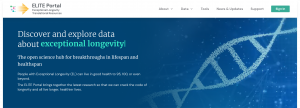
New Community Data Portal Provides Researchers with Unique Resources to Understand Human Longevity
The Exceptional Longevity Translational Resources (ELITE) Portal brings together multi-omic datasets to accelerate research into healthy aging.
Which factors contribute the most to longevity? How do we avoid chronic disease? And can we all achieve healthy aging?
The new ELITE (Exceptional Longevity Translational Resources) Portal, launched by Sage Bionetworks, offers research communities an open science platform for beginning to answer some of these big questions. It is now the largest repository for open-access molecular data on exceptional longevity.
Powered by Sage Bionetworks' Synapse ecosystem, the ELITE Portal provides centralized access to multiple studies and multi-omic datasets (e.g. genomics, transcriptomics, methylomics, proteomics and metabolomics) that scientists can mine and analyze to accelerate new discoveries in aging research.
The portal integrates samples from thousands of long-lived human participants with experimental data from animal models of aging and various cell-based assays.
“Centenarians with exceptional longevity are extremely rare in the population, so it’s critical we aggregate all the data we can across studies and cohorts to better understand human aging,” says Susheel Varma, PhD, MBA, FBCS, Chief Data Officer at Sage Bionetworks. “We wanted to build a resource with the right governance controls to share this critical data securely and ethically with our research communities.”
In addition to the extensive bank of datasets, the ELITE Portal provides researchers with access to various software tools and publications to explore the results of different longevity projects.
One key project hosted on the portal is the Longevity Genomics project, which identifies longevity-associated genes and explores strategies to identify targets for potential health-promoting therapeutics.
Another recently added project is the Long Life Family Study, which measures healthy aging phenotypes across multiple generations in families in the USA and Denmark.
“We’re excited to share these longitudinal, multi-omic data on unique human ancestry demonstrating familial longevity,” says Michael Province, PhD, Director of Statistical Genetics at Washington University in St. Louis and a collaborative investigator on the ELITE Portal. “These data from the Long Life Family Study can shed light on how some people are able to delay or escape age-related conditions, including Alzheimer’s Disease, and live much longer than average.”
Part of the ELITE Portal’s mission is to provide seamless and secure access to datasets in multiple analytical environments, giving users an alternative to downloading the files to their local work environment.
In service of this goal, the portal has already integrated the cloud-based analysis platform CAVATICA into its workspace. CAVATICA was co-developed by Velsera (formerly SevenBridges) and the Center for Data Driven Discovery in Biomedicine. Once users connect their CAVATICA account to Sage Bionetworks’ Synapse, they can identify their dataset of interest on the ELITE Portal and then export the data to CAVATICA to run downstream analyses.
Integrating these external platforms into the ELITE Portal will empower collaboration across dispersed researchers and improve data interoperability. As more researchers deposit new resources into the portal and continue to reuse the growing datasets, the hope is that new insights will translate into meaningful interventions that promote life span and health span.
The National Institute on Aging and Sage Bionetworks established the ELITE Portal in 2024. Following the success of Sage Bionetworks’ Alzheimer’s Disease (AD) Knowledge Portal, the ELITE Portal was created to consolidate and make readily available the valuable research resources generated by ongoing human longevity translational and related projects.
The ELITE Portal is supported by the NIA through grant U24AG078753.
Disclaimer: Sage Bionetworks may integrate with, and provide links to, compute environments as an alternative to downloading files. These integrations or provisions do not signify an endorsement of that particular environment by Sage Bionetworks or funders, nor does it alter the relationship between Sage Bionetworks, existing data contributors, project sponsors or funders, or computational providers.
Furthermore, it is the responsibility of individual users to review the terms of data use for each compute environment, as well as for the portal or repository from which the data is sourced. Users must personally ensure that all data access terms and conditions are met.
ABOUT SAGE BIONETWORKS
Sage Bionetworks is a non-profit health research organization based in Seattle, Washington. We guide responsible data sharing and reuse, benchmark scientific methods and results, and empower participants to be active partners in research. Learn more at https://sagebionetworks.org/
To actively partner with Sage Bionetworks, contact us at partnerwithus@sagebionetworks.org
Mackenzie Wildman
Sage Bionetworks
communications@sagebionetworks.org
Visit us on social media:
Facebook
X
LinkedIn
Instagram
YouTube
Other
Distribution channels: Chemical Industry, Education, Healthcare & Pharmaceuticals Industry, Science, Technology
Legal Disclaimer:
EIN Presswire provides this news content "as is" without warranty of any kind. We do not accept any responsibility or liability for the accuracy, content, images, videos, licenses, completeness, legality, or reliability of the information contained in this article. If you have any complaints or copyright issues related to this article, kindly contact the author above.
Submit your press release
